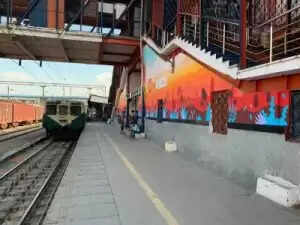Major Rail Projects Approved by Modi Government to Boost Connectivity
Significant Railway Developments Announced

New Delhi: On Friday, the Cabinet Committee on Economic Affairs, led by Prime Minister Narendra Modi, sanctioned four railway projects with a total investment of approximately Rs 18,658 crore, as reported by a government press release.
These initiatives will span 15 districts across Maharashtra, Odisha, and Chhattisgarh, expanding the Indian Railways network by around 1,247 kilometers.
The projects encompass the construction of third and fourth lines between Sambalpur and Jarapda, as well as Jharsuguda and Sason; the addition of fifth and sixth lines between Kharsia-Naya Raipur and Parmalkasa; and the doubling of the line from Gondia to Balharshah.
According to the press release, "The increased line capacity will enhance mobility, leading to improved efficiency and reliability of services for Indian Railways. These multi-tracking initiatives will alleviate operational congestion and facilitate much-needed infrastructure development on the busiest railway sections."
The statement further noted, "These projects align with Prime Minister Modi's vision for a New India, aiming to empower local communities through comprehensive development, thereby boosting employment and self-employment opportunities in the region."
The government highlighted that these projects stem from the PM-Gati Shakti National Master Plan, which focuses on multi-modal connectivity achieved through integrated planning to ensure seamless movement of people, goods, and services.
The benefits of these projects include the construction of 19 new stations, improving access to two aspirational districts, Gadchiroli and Rajnandgaon, and enhancing connectivity for approximately 3,350 villages, impacting around 47.25 lakh residents.
The Kharsia–Naya Raipur–Parmalkasa route will directly connect new areas like Baloda Bazar, fostering opportunities for establishing new industrial units, including cement plants.
Additionally, these routes are vital for transporting essential commodities such as agricultural products, fertilizers, coal, iron ore, steel, and cement. The capacity enhancements are expected to generate an additional freight traffic of 88.77 million tonnes per annum (MTPA).
Regarding environmental impacts, the government emphasized that railways, being an eco-friendly and energy-efficient transport mode, will contribute to achieving climate objectives, reduce logistics costs, decrease oil imports by 95 crore liters, and lower CO2 emissions by 477 crore kg, equivalent to planting 19 crore trees.
